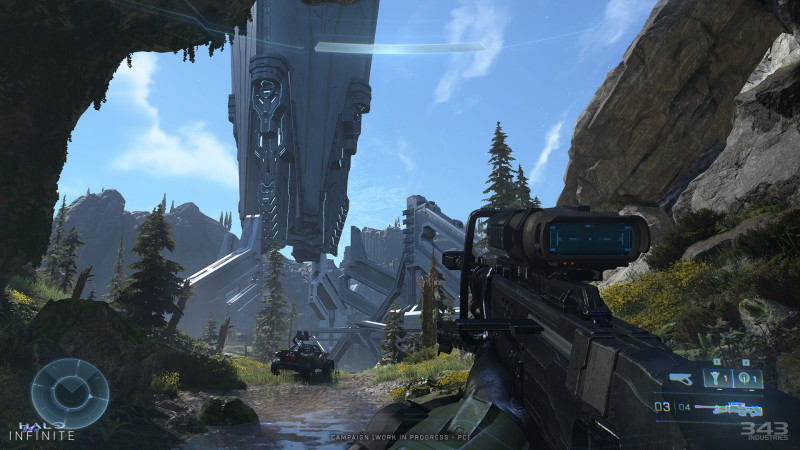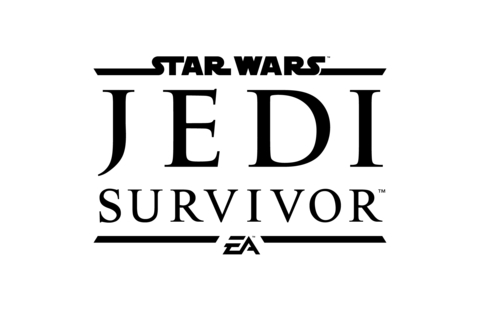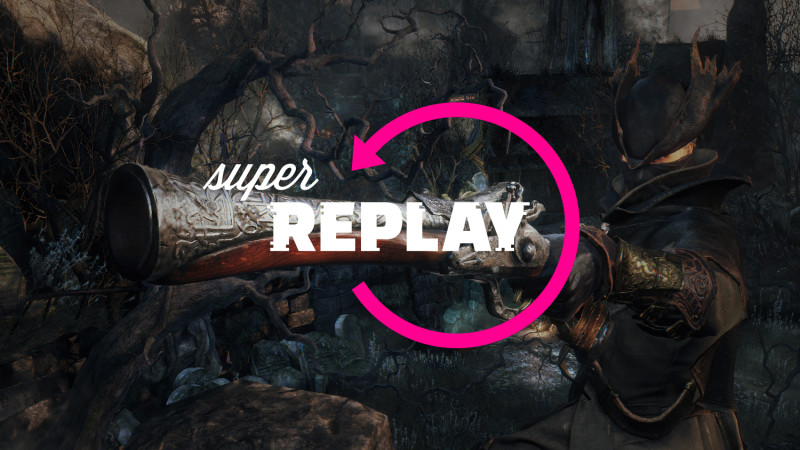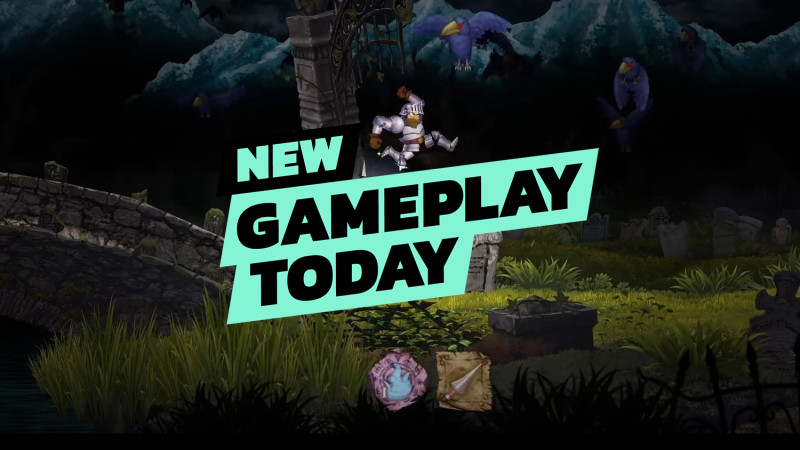5 Fantasy RPGs To Play If You Like D&D
Ask anyone who has been involved with the tabletop role-playing scene for a long time, and they’ll confirm that we’re in the middle of a golden age for the hobby. A number of factors – including livestreamed shows, remote play options, crowdfunded projects, and mature design – have led to an explosion of interest in the role-playing experience.
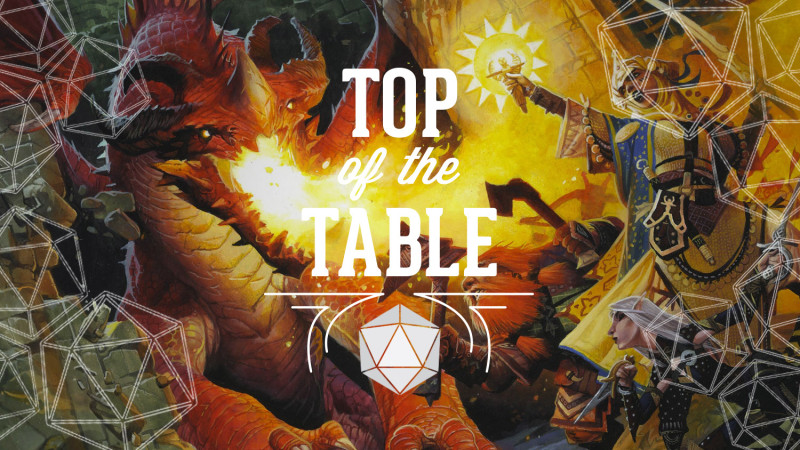

Ask anyone who has been involved with the tabletop role-playing scene for a long time, and they’ll confirm that we’re in the middle of a golden age for the hobby. A number of factors – including livestreamed shows, remote play options, crowdfunded projects, and mature design – have led to an explosion of interest in the role-playing experience.
Without a doubt, the latest version of the original tabletop RPG, Dungeons & Dragons, remains a driving force for the current success across the industry. The excellent 5th edition has done wonders for uniting disparate fan groups of the game around an approachable (but still nuanced) fantasy role-playing system. As a player of various editions of that game since childhood, I’ll be the first to recommend the current edition of D&D to both newcomers and old-timers.
At the same time, the breadth of the hobby has grown so much that I also recommend players consider the tremendous variety of other games on the market today. Even if you desire to stay mostly within the bounds of the fantasy milieu, there’s no shortage of options. And that’s without even stepping beyond into other genres or playstyles, which could easily occupy a whole range of additional articles like this.
These games will refresh both GMs and players, with different rulesets and approaches that are sure to reinvigorate the whole group’s excitement. Moreover, I think you’ll find that exploring other game systems often has major benefits, even if you ultimately return to the familiar territory of d20-style D&D games, as you carry some of your favorite ideas back.
Here are five of my top recommendations of other fantasy role-playing games you should try, each of which brings some wonderful mechanics and playstyles to the table.
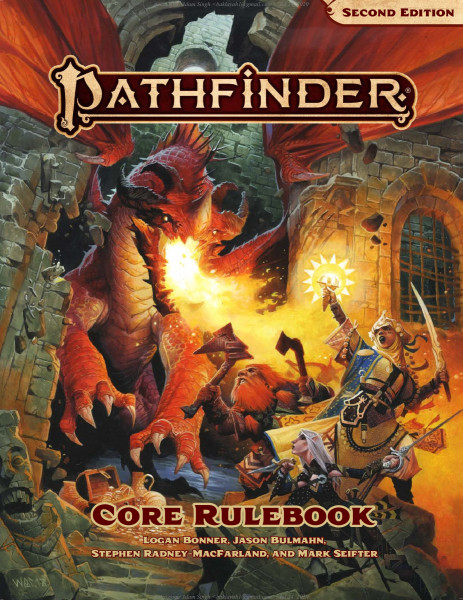
Pathfinder: 2nd Edition
Publisher: Paizo
If you like the general structure of D&D, but you’re looking for more options and a style of play that more closely emulates the venerated 3rd edition, you should strongly consider diving into Pathfinder. Paizo’s flagship property began as an outgrowth of the D&D 3.5 edition ruleset, but as Wizards of the Coast moved on from that, Paizo transformed Pathfinder into its own fully realized experience. In the many years since, that system has continued to be refined and developed, eventually resulting in the impressively flexible Pathfinder 2nd Edition game.
If your gaming group likes the idea of trying something new, and is ready for a bit of increased complexity and customization, Pathfinder 2E is the ideal choice. Many mechanics will be instantly familiar, from the focus on d20 rolls for action resolution to the general flow of play. But Pathfinder has some meaningful distinctions, including an action system that tends to provide for more tactical choices in a given round, as well as a character builds that have more room for customization. In general, it’s a “crunchier” game than modern D&D, with more complexities and rules to track. But the rulebooks are remarkably well-written and feature gorgeous design and illustrations, easing you into any new ideas without making you feel overwhelmed.
Pathfinder is an easy recommendation to make, especially to existing D&D players, since it shares so many of its roots with the more well-known and longer-running game. I often tell people that Pathfinder feels like playing an alternate timeline of how D&D could have developed over the last decade-plus, and both timelines have turned out pretty amazing.
Also Consider: Starfinder
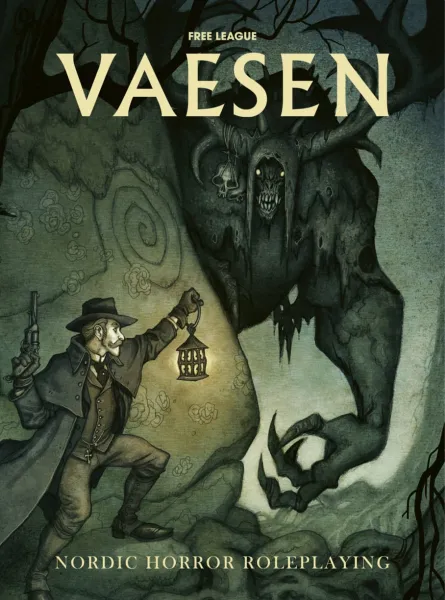
Vaesen
Publisher: Free League Publishing
One of my favorite new entries in the RPG field from the last few years, Vaesen is a wonderful departure from expectation. A simple and elegant rules system won’t take your group long to learn, and the 19th century Scandinavian folklore setting is miles away from D&D’s familiar western medieval adventures, but still rooted firmly in the fantasy tradition, albeit with a hefty dose of atmospheric horror thrown into the mix.
Vaesen draws from one central artistic inspiration, and a separate core game design source. The artistic and setting source is found in the art of Swedish illustrator/author, Johan Egerkrans. He’s become known for his evocative takes on Scandinavian monsters, gods, and other mythological elements, having published a series of wonderful art books that include fictional elements, and his art is gloriously spread across the game. Meanwhile, Vaesen borrows its core gaming engine from other Free League books, adapting the stellar Year Zero system from other games the company has released, like Tales from the Loop and Mutant Year Zero.
Players control investigators who – due to some past trauma or event – have gained the Sight, and can see the invisible creatures like trolls, fairies, and ghosts, that act to manipulate or interact with the world of people. Taking on archetypes like hunters, priests, or scholars, you investigate the strange happenings involving these “vaesen” across Scandinavia, working to resolve conflicts that often arise between the old ways of nature, and the burgeoning worlds of industry and modernity.
Vaesen and its unique rules focus less on constant combat, and more on mystery, atmosphere, character relationships, and encounters without clear-cut answers. The clever structure of play moves the group between important scenes, much in the way you’d expect a good movie to skip over the small stuff. Play groups can also expect a healthy dose of gothic horror, where the mundane is suddenly thrown into stark relief against the terrifying power and fickle aspects of nature unbound.
Also Consider: Tales From The Loop, Forgotten Lands
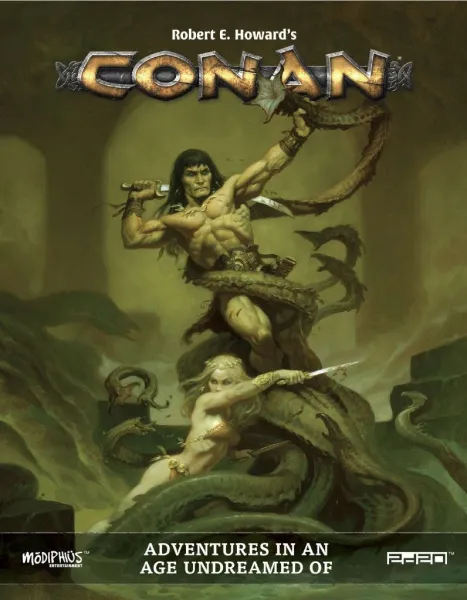
Conan: Adventures In An Age Undreamed Of
Publisher: Modiphius
The entire genre of fantasy, specifically anything related to sword-and-sorcery vibes, owes much to the storytelling of Robert E. Howard, and the tales he spun of Conan the Barbarian. Modiphius took up the challenge of bringing Conan’s world to life in its role-playing adaptation of the setting, leveraging the company’s successful 2d20 tabletop RPG game system to invigorate and realize the bloody, swashbuckling, and primitive tone that pervades the world of the Hyborian Age. For gaming groups that want to focus on savage encounters, particularly deadly and evil magic, along with exciting action-packed adventures, this is an awesome choice.
Modiphius’ 2d20 system has a lot of things worth celebrating, and the system is strong enough that the publisher has adapted it for a number of different settings in all kinds of genres, including everything from Star Trek to John Carter of Mars. In Conan, the most notable dynamic at play is the push and pull between a shared player bonus pool called Momentum, and a similar pool called Doom that the GM can pull from to create additional challenge. By drawing from this bonus pool, PCs can accomplish remarkable tasks at critical moments, or villains can enact particularly devastating actions.
Consider the Conan RPG if your aim is to amp up the action of big battles, focus on party cohesion and cooperation, or if you simply love the idea of a tailor-made system built around this expansive fantasy world. Modiphius is known for its high production values, as well as its meticulous research to nail the "feeling" of a property. Both those dynamics are in place with this Conan RPG, which captures the magic and intensity of those early pulpy stories.
Also Consider: John Carter of Mars, Star Trek Adventures
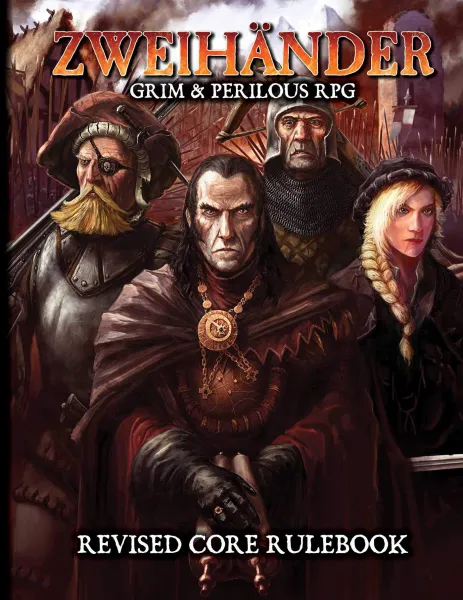
Zweihänder: Grim & Perilous RPG
Publisher: Andrews McMeel Publishing
If D&D has always felt just a bit too colorful and whimsical, and you and your group just really want to embrace the darker and grittier aspects of the fantasy genre, then you should take a close look at Zweihänder. While the game nods to the oldest of old-school tendencies in the role-playing genre, it’s more fair to say that it looks to one corner of those traditions – where luckless vagabonds and adventurers struggle against nearly impossible odds, often dying along the way, but seeing some bloody and grim battles fought on their way down.
Zweihänder embraces a relatively simple-to-grasp percentile-based rules system for resolving actions, but it’s the many details and character options that flesh out the massive 700-page tome that makes up the core book. Rather than more stratified classes that present lots of room for customizing, the game includes a plethora of professions (well over 100 in the core book) that let you take on all kinds of weird and wonderful roles, from jesters and animal tamers to necromancers and inquisitors. Those professions are given added depth as players take on a variety of skills and talents, which they may desperately try to use to survive in a horribly unfair and often chance-driven world.
I’ve heard from many potential players over the years about their enthusiasm for the worlds presented in franchises like George R.R. Martin’s A Song of Ice and Fire (Game of Thrones), or Andrzej Sapkowski’s The Witcher, which feature dark themes, brutal political machinations, and unlikely heroes drawn into impossible conflict. In many ways, Zweihänder offers a better fit for those kind of stories than the more general purpose fantasies supported by D&D. If you’re willing to put in the work to learn and embrace a very different set of mechanics, you’ll find a lot to love in Zweihänder.
Also Consider: Mythras, Warhammer Fantasy Roleplay: 4th Edition
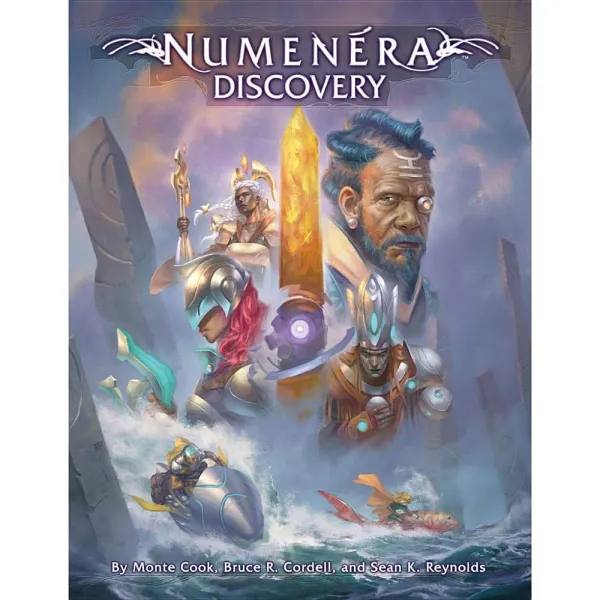
Numenera
Publisher: Monte Cook Games
You like the emotional tone and sense of exploration and discovery that is core to fantasy narratives, but you’re sick to death of dragon-slaying knights and wizards in a western European setting? For those ready for something completely different, there is no better fantasy game to embrace than the weird and lavishly imagined universe of Numenera.
After a long tenure contributing to the Dungeons & Dragons game, Monte Cook started his own company and released the first iteration of Numenera back in 2013. The game is set on Earth in an impossibly distant future. After a long absence, humanity has come again to the planet after eight prior great civilizations have risen and fallen, leaving behind the detritus of technology that is indistinguishable from magic for those who live there. Players take on the role of explorers and builders who sift through the remains of these old civilizations, repurposing it to fuel a new age of discovery.
Firmly rooted in the traditions of science/fantasy as well as a variation of the sub-genre often called Dying Earth, Numenera will win your affection thanks to the constant surprises and unique ideas that make up its world. From monsters to locations to adventure hooks, the game excels at presenting insane twists on expectation, playing with the ideas of reality, time, technology, virtual existence, and alternate dimensions, all while remaining firmly rooted in tropes of the classic fantasy adventuring party.
Numenera is a rules-light game that values narrative flexibility and player participation over almost all else. This is a place for a gaming group to be inventive and push the boundaries of character creation and storytelling, and it demands a narrator who likes to be the architect of a game, but who also wants the players to actually be the builders. The game was given increased depth by a loose second edition a few years ago (presented as a paired set of books called Numenera: Discovery and Numenera: Destiny), which expanded on the existing rules without invalidating what came before. Numenera is a personal favorite of mine; as someone who spent years loving D&D (and I still do), this is a game that is a stark departure, focused on fewer rules and more on weird moments of wonder, and I can’t recommend it enough. And, as an aside, if you want a taste of Numenera's unique tone without leaving behind D&D 5E rules, Monte Cook Games has you covered with its excellent Arcana of the Ancients supplement.
The role-playing game scene today is filled with an array of remarkable projects. In the fantasy genre, D&D serves a wonderful role, acting as an an adaptable and streamlined game system that carries the advantage of familiarity – many gamers have already encountered its core conceits in other places, like in video games. It's a great place to start, but can also fuel years or even decades of fun. Even so, with so many rich systems out there to dig into, it would be a shame to not try out more of what is on offer, and the above recommendations just scratch the surface of other fantasy games you might enjoy. If you're a dedicated role-playing gamer, I can't stress enough how much fun is waiting for you if you stretch your wings and explore other game systems.
If you’d like a more focused recommendation catered to your group, drop me a line via email, and I'll try to help you out. If you’re just looking for other great tabletop games to enjoy with friends and family, feel free to peruse the backlog of our Top of the Table articles, where you’ll find a selection of strong options, including some of the best tabletop RPGs of 2020.












